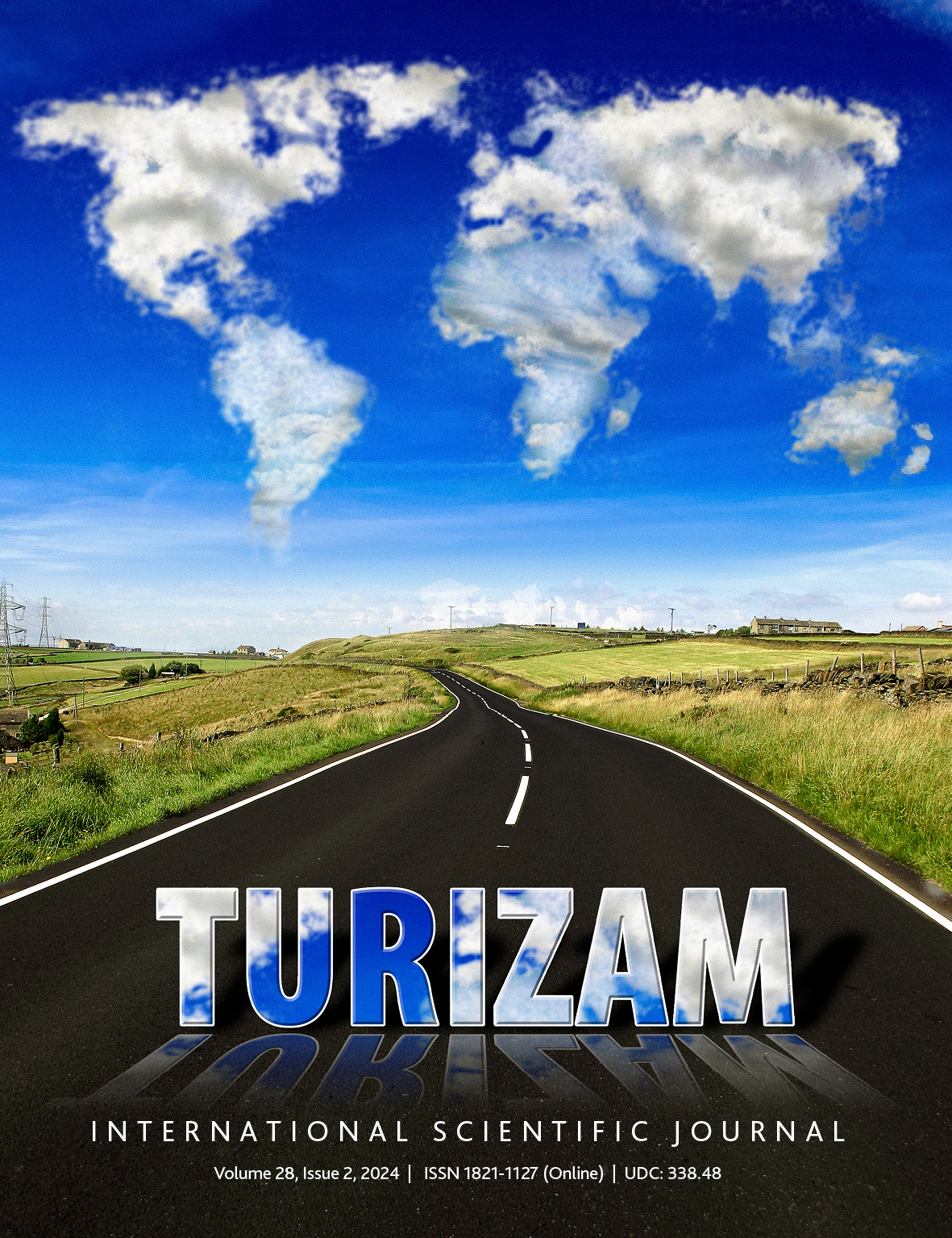Basic directions and possibilities of sustainable development of tourism from the aspect of economic indicators of sustainability - Mountains case study
Abstract
The paper deals with the concept of sustainable tourism in mountainous, rural areas of Serbia and its economic indicators, i.e., the impact of economic indicators of sustainability on the local community, with the aim of pointing out the potential directions of tourism development. The research was conducted in selected rural areas of Zlatibor, Kopaonik, Stara Planina and Fruška Gora. Respondents expressed their opinion on the issue of sustainable tourism development, how sustainable tourism has contributed to the local community and the local population, which elements of sustainability have been fulfilled and in what way. It was concluded that residents of rural mountain destinations believe that truism directly and positively affects the sustainable development of rural destinations, thus confirming the initial hypothesis H that the economic indicators of sustainable tourism development provide a better quality of life for local communities.
References
2. An, W., & Alarcon, S. (2020). How can rural tourism be sustainable? A systematic review. Sustainability, 12(18), 7758.
3. Balaguer, J., & Cantavella-Jorda, M. (2002). Tourism as a long-run economic growth factor: The Spanish case. Applied Economics, 34, 877–884.
4. Blake, A. (2009). The dynamics of tourism’s economic impact. Tourism Economics, 15(3), 615–628.
5. Chen, J., Huang, Y., Wu, E. Q., Ip, R., & Wang, K. (2023). How does the rural tourism experience affect green consumption in terms of memorable rural-based tourism experiences, connectedness to nature and environmental awareness?.Journal of Hospitality and Tourism Management, 54, 166-177.
6. Fallon, P., & Schofield, P. (2006). The dynamics of destination attribute importance. Journal of Business Research, 59(6), 709-713.
7. Germanovich, A. G., Vasilieva, O. N., Ordynskaya, M. E., Allanina, L. M., & Gorokhova, A. E. (2020). Impact of tourism on sustainable development of rural areas: International experience. Journal of Environmental Management & Tourism, 11(4 (44)), 965-972.
8. Gao, J., & Wu, B. (2017). Revitalizing traditional villages through rural tourism: A case study of yuanjia village, shaanxi province, China. Tourism management, 63, 223–233.
9. Huo, M., Shao, Y., Li, M., &Li, Z. (2023). Residents’ participation in rural tourism and interpersonal trust in tourists: The mediating role of residents’ perceptions of tourism impacts Tingting Huo, Feng Yuan, Tourism Management, 54, 457-471
10. Ruiz-Real, J. L., Uribe-Toril, J., de Pablo Valenciano, J., & Gázquez-Abad, J. C. (2022). Rural tourism and development: Evolution in scientific literature and trends. Journal of Hospitality & Tourism Research, 46(7), 1322-1346.
11. Quaranta, G., Citro, E., & Salvia, R. (2016). Economic and social sustainable synergies to promote innovations in rural tourism and local development. Sustainability, 8(7), 668.
12. Jovanović, V. (2020). Turizam i prostor, Udžbenik, Univerzitet Singidunum, 106 - 114.
13. Kachniewska, M. A. (2015). Tourism development as a determinant of quality of life in rural areas. Worldwide Hospitality and Tourism Themes, 7(5), 500-515.
14. Likert, R. (1967). “The Method of Constructing an Attitude Scale”. In Readings in Attitude Theory and Measurement, M. Fishbein, (ed.). pp. 90-95. New York: Wiley
15. Maksimović, G., Ivanović, T., Vujko, A. (2019). Self-employment of women through associations in the rural areas of Sirinicka zupa. Economic of Agriculture, 66(1), 251-263.
16. Nunkoo, R., & Ramkissoon, H. (2012). Power, trust, social exchange and community support. Annals of Tourism Research, 39(2), 997–1023. https://doi.org/10.1016/j. annals.2011.11.017
17. Petelca, O., & Garbuz, V. (2020). Social and economic effects of rural tourism on the development of rural areas. CES Working Papers, 12(2), 123-143.
18. Strzelecka, M., Boley, B. B., & Strzelecka, C. (2017). Empowerment and resident support for tourism in rural Central and Eastern Europe (CEE): The case of Pomerania, Poland. Journal of Sustainable Tourism, 25(4), 554-572.
19. Vujko, A., Tretiakova, N.T., Petrović, M., Radovanović, M., Gajić, T., Vuković, D. (2018). Women's empowerment through self-employment in tourism. Annals of tourism research, 76, 328-330, https://doi.org/10.1016/j.annals.2018.09.004
20. Vujko, A.,Zečević, S.O., Zečević, L., Nedeljković, D., Zečević, M. (2021). Rural residents’ perceptions on economic impacts of cultural and promotional aspects of tourism. Economic of Agriculture, 68(1), 155-173.
21. Vujko, A., Petrović, M., Dragosavac, M., Ćurčić, N., Gajić, T. (2017): The linkage between traditional food and loyalty of tourists to theruraldestinations. Teme, 41(2), pp. 475-487, https://doi.org/10.22190/TEME1702475V
22. Vunjak, M.N., Vujko, A., Dragosavac, M., Antonijević, N.T. (2020). Descriptive statistics in corporate management and employee engagement in rural destinations. Economic of Agriculture, 67(4), 1087-1101.
23. Wijijayanti, T., Salleh, N. H. M., Hashim, N. A., Mohd Saukani, M. N., & Abu Bakar, N. (2023). The feasibility of rural tourism in fostering real sustainable development in host communities. GeoJournal of Tourism and Geosites, 46(1), 336-345.
24. Citiranje i referenciranje dostupno preko:
https://www.infokop.net/o-kopaoniku/prirodne-odlike.html (preuzeto 26.01.2024)

